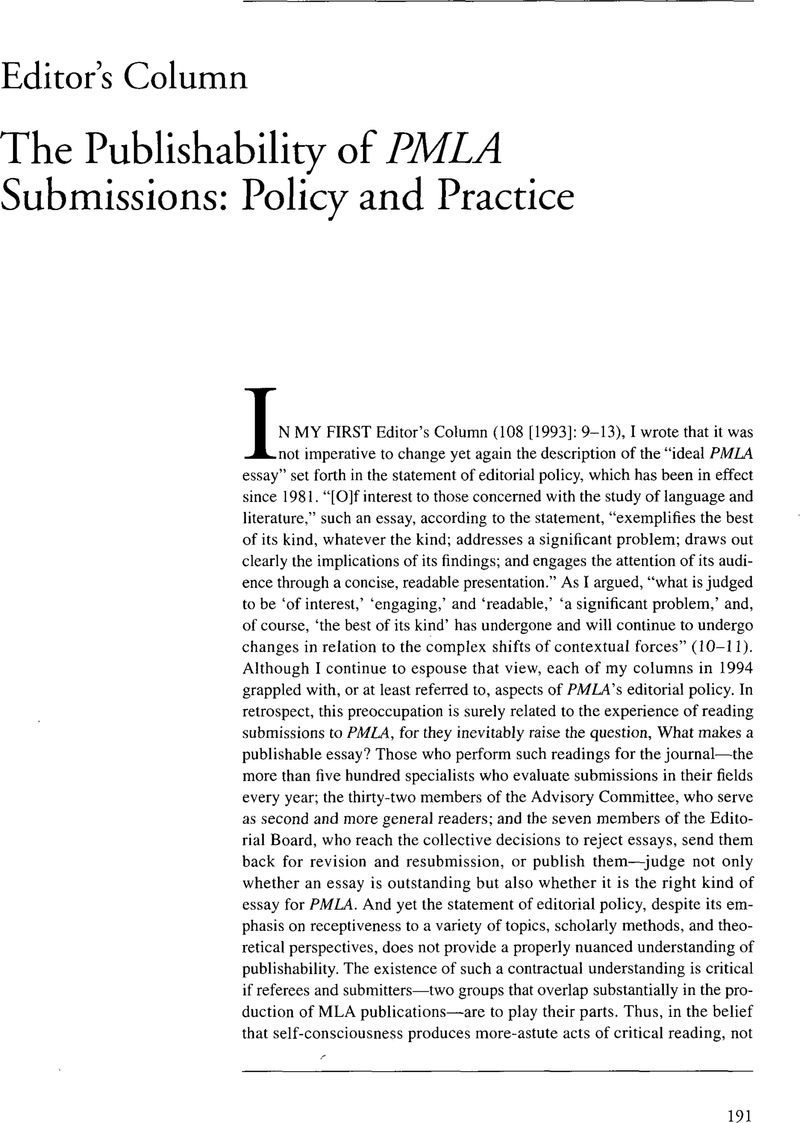No CrossRef data available.
Article contents
Editor's Column: The Publishability of PMLA Submissions: Policy and Practice
Published online by Cambridge University Press: 23 October 2020
Abstract

Information
- Type
- Editorial
- Information
- Copyright
- Copyright © Modern Language Association of America, 1995
References
Notes
1 Rabinowitz, however, does not require every article to be “theoretically self-reflective…. While I still admire that quality in essays, I suspect it is too idiosyncratic to stand as a general recommendation.” By contrast, Bernheimer recommends theoretical essays, on the condition that they “demonstrate how the theory or theories under investigation work in practical applications…. Authors should try to offer some concrete examples so as not to leave theoretical speculations floating in an entirely abstract space.” Greg Lucente, who argues that the editorial policy elicits “hyperrational (and, frankly, rather conservative) analysis and explication,” believes that “the contents of the journal in recent years… are getting away from this model” and suggests an addition to the statement, “something like: ‘Essays demonstrating not only critical rigor but also imaginative speculation (whether concerned with notions of history, society, gender, culture, or all of these) are also welcome.‘” It should be noted that changes in the journal's editorial policy fall within the purview of the association's Executive Council.
2 Surprisingly, only Mellor mentions the broader interest of essays that “cover more than one field of specialization.” Suzanne Fleischman underscores the problems of working across disciplines, reminding authors who apply to literature the theory or methodology of another field to make sure that “their analyses rest on a … thorough … grounding in the other field….” The respondents refer principally to disciplinary studies of general import rather than to pluridisciplinary or interdisciplinary work. This phenomenon may reflect the predominantly disciplinary divisions of the MLA, which tend to determine the categories of appointments to the Advisory Committee and the Editorial Board.
3 Hume explains that “if you use WordPerfect 6.0 … in five seconds you can have the numbers for three readability scales. I'm sure that the other major word-processing programs do the same.”
4 In this context, Gail Finney observes that manuscripts she receives for evaluation occasionally contain “inadequate editing, egregious numbers of typos, spelling errors, and other stylistic flaws.”
5 One of the reasons that the “only issue at hand” can be the text is the journal's author-anonymous reviewing policy. In Nina Baym's view, however, this policy has made senior faculty members less inclined to submit their work to PMLA. Her conclusion would be difficult to test empirically because numerous factors could contribute to such a hypothetical decline, including the more immediate access (through commissions for articles, for example) that senior faculty members, by and large, gain to journals in their field.

